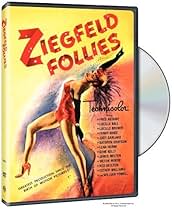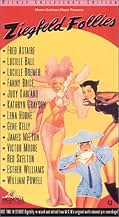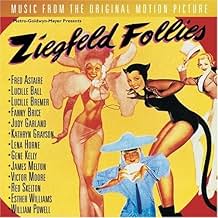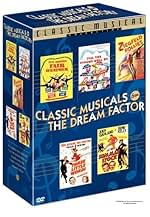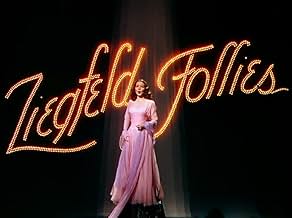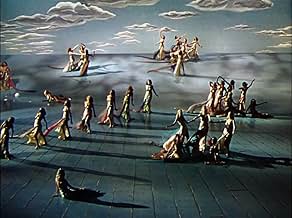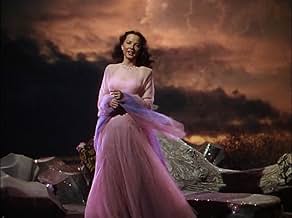IMDb-BEWERTUNG
6,4/10
3909
IHRE BEWERTUNG
Füge eine Handlung in deiner Sprache hinzuThe late, great impresario Florenz Ziegfeld Jr. looks down from Heaven and ordains a new revue in his grand old style.The late, great impresario Florenz Ziegfeld Jr. looks down from Heaven and ordains a new revue in his grand old style.The late, great impresario Florenz Ziegfeld Jr. looks down from Heaven and ordains a new revue in his grand old style.
- Auszeichnungen
- 1 Gewinn & 1 Nominierung insgesamt
Empfohlene Bewertungen
When I first heard about this movie, & saw that the real Fanny Brice, Red Skelton, Judy Garland, & all the other greats from this era were in this, I knew I had to see it. I only wish the whole film lived up to the sum of its parts. The star power in this movie would blow anything over.
I think the fault here is that the film comes off as a lot of dis-jointed performances which while well-staged & good, have nothing to tie you to the film & stay interested in it. The great musicals such as 2006's DreamGirls have that kind of thing. As a result, the main interest for someone watching this is to take a DVD of it with a scene menu & go to you favorite performers part in it.
After seeing Streisand play Fanny Brice, it is interesting to see the real woman as she was versus Bab's portrayal of her. This film is lavish & MGM's Technicolor is great as usual. The film just doesn't flow very well which is a shame. It looks like no one wanted to hire good writers for a script.
MGM made this on the presumption that just the stars would put people in the theater seats. I bet it did in it's time, but I only wish it had been done better now.
I think the fault here is that the film comes off as a lot of dis-jointed performances which while well-staged & good, have nothing to tie you to the film & stay interested in it. The great musicals such as 2006's DreamGirls have that kind of thing. As a result, the main interest for someone watching this is to take a DVD of it with a scene menu & go to you favorite performers part in it.
After seeing Streisand play Fanny Brice, it is interesting to see the real woman as she was versus Bab's portrayal of her. This film is lavish & MGM's Technicolor is great as usual. The film just doesn't flow very well which is a shame. It looks like no one wanted to hire good writers for a script.
MGM made this on the presumption that just the stars would put people in the theater seats. I bet it did in it's time, but I only wish it had been done better now.
This film is just what it says on the tin, a collection of pieces and sketches similar to those you would have seen in a real Ziegfeld show.
Introduced from Heaven by Ziegfeld himself (William Powell reprising his role of ten years earlier), the acts are rolled out one by one for our appreciation and enjoyment.
High points which spring to mind are Fred Astaire as a jewel thief, charming Lucille Bremer; and as a Chinese n'er do well wishing he could get Bremer the fan she wants. Cyd Charisse and others dancing through bubbles as Kathryn Grayson warbles 'Beauty'. Judy Garland as 'the great lady' mocking Greer Garson. And of course 'The Babbitt and the Bromide' which teams Astaire and Gene Kelly for the first time.
The comedy segments sit less well today and all are too long, however, they're not bad. Keenan Wynn struggles with a dumb telephone operator; Victor Moore has a tightwad lawyer who gets him into jail; Fanny Brice wins the Irish sweepstake; and Red Skelton advertises Guzzler's Gin.
Add Lucille Ball and her cat girls, a touch of La Traviata, and a bevy of lovelies to open and close the show, and you can see why this film was a hit on its first release.
Good for historical interest and the frequent highs, but you might find your attention wandering now and then.
Introduced from Heaven by Ziegfeld himself (William Powell reprising his role of ten years earlier), the acts are rolled out one by one for our appreciation and enjoyment.
High points which spring to mind are Fred Astaire as a jewel thief, charming Lucille Bremer; and as a Chinese n'er do well wishing he could get Bremer the fan she wants. Cyd Charisse and others dancing through bubbles as Kathryn Grayson warbles 'Beauty'. Judy Garland as 'the great lady' mocking Greer Garson. And of course 'The Babbitt and the Bromide' which teams Astaire and Gene Kelly for the first time.
The comedy segments sit less well today and all are too long, however, they're not bad. Keenan Wynn struggles with a dumb telephone operator; Victor Moore has a tightwad lawyer who gets him into jail; Fanny Brice wins the Irish sweepstake; and Red Skelton advertises Guzzler's Gin.
Add Lucille Ball and her cat girls, a touch of La Traviata, and a bevy of lovelies to open and close the show, and you can see why this film was a hit on its first release.
Good for historical interest and the frequent highs, but you might find your attention wandering now and then.
If you get easily bored with those old movies that seem to roll and roll forever, this is for you. It really has no plot, but you really don't need one. You could call this movie the Grand Ball, because it really is a set of dances. (Except for a few comedy scenes) Overall, I strongly believe that it is a really good movie, especially in those Fred Astaire numbers (Here's to the Girls, This Heart of Mine, and the Limehouse Blues) This movie is a real MUST for classic movie and Ziegfeld lovers alike.
If a star-studded Hollywood cast from the 'Golden' years makes you enjoy a film, that alone will be enough to tide you over the nearly 2 hours of this musical bonanza. It seems nearly everyone is present.
True to the nature of the revue, there's no story and just a series of vignettes that come and go. Among them, Fred Astaire and Gene Kelly have a dance show-off, your only chance to see one from this time. Esther Williams gives us a lovely underwater ballet, I would like to see more of her.
In spite of the scale of the production, the lavish sets and elaborate costumes, this is not, of course, aristocratic entertainment for those with a refined taste in music and dance but low brow frill aimed at the broad audience.
The revue was television of its time - an opportunity to shift among a few fluffy entertainments after a long day, nothing demanding our engagement beyond the few minutes of a skit. These days it seems to survive in SNL. The bits here alternate between broad comedy skits and song and dance numbers.
It's not bad, not particularly great either. It's not what I look for in a musical, and I will always opt for the fuller engagement of long narrative.
More interesting for me here are all the self-referential bits.
In the Astaire/Kelly show-off Fred, established musical royalty, plays a joke of pretending to not know who Kelly is.
Judy Garland enters her segment as herself, musing to a chorus of reporters about preferring song and dance roles rather than dramatic.
These people are here as themselves, the veneer of fiction is thin, opportunity for scenery and costume. You'll see some gorgeous examples of both, among the standouts for me being the all red ballroom in which Astaire swindles the rich countess and the dreamy finale, with chorus girls swirling through billows of bubbly foam. Briefly glimpsed among them is Cyd Charissee in her first appearance.
The whole is framed as Ziegfeld in heaven reminiscing about the shows he put on.
My favorite bit is the Chinatown skit with Astaire as a poor coolie dreaming about a woman he passes by on the street. His unrequited love becomes a dance they have together holding hand fans.
True to the nature of the revue, there's no story and just a series of vignettes that come and go. Among them, Fred Astaire and Gene Kelly have a dance show-off, your only chance to see one from this time. Esther Williams gives us a lovely underwater ballet, I would like to see more of her.
In spite of the scale of the production, the lavish sets and elaborate costumes, this is not, of course, aristocratic entertainment for those with a refined taste in music and dance but low brow frill aimed at the broad audience.
The revue was television of its time - an opportunity to shift among a few fluffy entertainments after a long day, nothing demanding our engagement beyond the few minutes of a skit. These days it seems to survive in SNL. The bits here alternate between broad comedy skits and song and dance numbers.
It's not bad, not particularly great either. It's not what I look for in a musical, and I will always opt for the fuller engagement of long narrative.
More interesting for me here are all the self-referential bits.
In the Astaire/Kelly show-off Fred, established musical royalty, plays a joke of pretending to not know who Kelly is.
Judy Garland enters her segment as herself, musing to a chorus of reporters about preferring song and dance roles rather than dramatic.
These people are here as themselves, the veneer of fiction is thin, opportunity for scenery and costume. You'll see some gorgeous examples of both, among the standouts for me being the all red ballroom in which Astaire swindles the rich countess and the dreamy finale, with chorus girls swirling through billows of bubbly foam. Briefly glimpsed among them is Cyd Charissee in her first appearance.
The whole is framed as Ziegfeld in heaven reminiscing about the shows he put on.
My favorite bit is the Chinatown skit with Astaire as a poor coolie dreaming about a woman he passes by on the street. His unrequited love becomes a dance they have together holding hand fans.
Ziegfeld Follies is a musical comedy from 1946, from the time when they made lots of musical movies.There really isn't a plot in this movie, but who needs one anyway.As long the musical numbers are working, you really don't need a plot in a movie like this.And then there are also some really funny sketches in the movie.Especially I liked Red Skelton's and Keenan Wynn's acts.They really make you laugh.And then it is great fun to watch Fred Astaire's and Gene Kelly's musical number.This was their only musical act together.Ziegfeld Follies has many great musical numbers.The younger generation doesn't care so much about musical movies, but I'm a teen ager and I like these old musical movies.These kind of movies make me miss those times, and I wasn't even born back then!
Wusstest du schon
- WissenswertesAt the beginning of the "Bring On The Beautiful Girls" number, several older women are shown; these are women who actually appeared in the original Ziegfeld Follies on stage.
- PatzerTowards the end of "This Heart of Mine", as Fred Astaire and Lucille Bremer begin to dance back to the palace, dancers in the background (screen left) struggle to stabilize some of the antler-tree props.
- Zitate
Florenz Ziegfeld Jr.: Children play with the dreams of tomorrow. And old men play with the memories of yesterday.
- Crazy CreditsZiegfeld Follies credits are in alphabetical order. That is why "Bunin" comes before "Charisse"
- Alternative VersionenThere is an Italian edition of this film on DVD, "FOLLIE DI ZIEGFELD", re-edited in double version (1.33:1 and 1.78:1) with the contribution of film historian Riccardo Cusin This version is also available for streaming on some platforms.
- VerbindungenEdited into Hollywood: The Dream Factory (1972)
- SoundtracksHere's to the Girls
Music by Roger Edens
Lyrics by Arthur Freed
Sung by Fred Astaire, chorus
Danced by Cyd Charisse, Lucille Ball, chorus
Top-Auswahl
Melde dich zum Bewerten an und greife auf die Watchlist für personalisierte Empfehlungen zu.
- How long is Ziegfeld Follies?Powered by Alexa
Details
- Erscheinungsdatum
- Herkunftsland
- Sprache
- Auch bekannt als
- Ziegfeld Follies of 1944
- Drehorte
- Produktionsfirma
- Weitere beteiligte Unternehmen bei IMDbPro anzeigen
Box Office
- Budget
- 3.240.816 $ (geschätzt)
- Laufzeit
- 1 Std. 25 Min.(85 min)
- Farbe
- Seitenverhältnis
- 1.37 : 1
Zu dieser Seite beitragen
Bearbeitung vorschlagen oder fehlenden Inhalt hinzufügen


